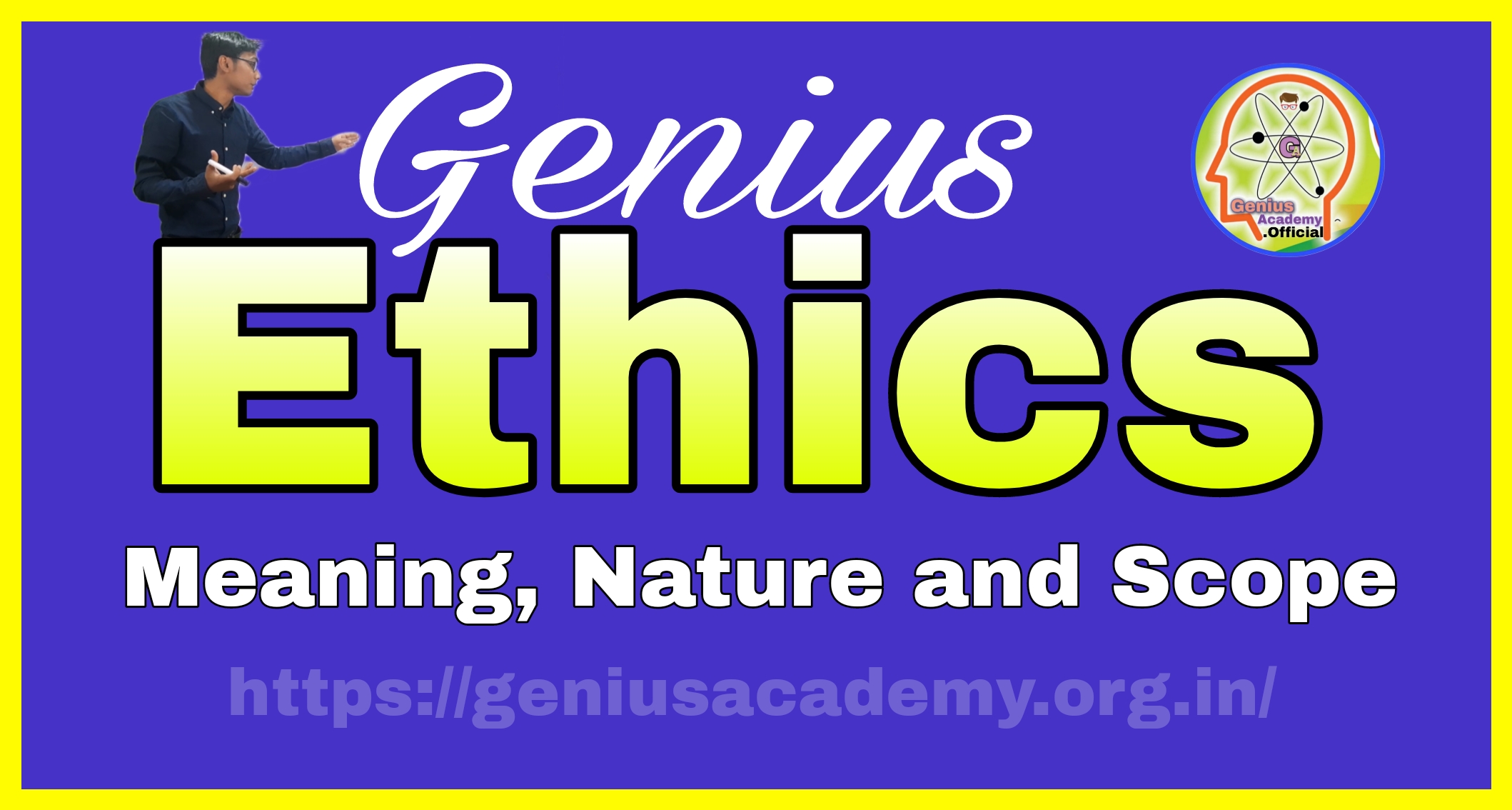CHAPTER 1 : Ethics and Human Interface
Ethics: Meaning, Nature, and Scope
Ethics is the systematic study of human actions with a focus on understanding whether those actions are right or wrong. It evaluates human behavior by asking what should or should not be done to lead a morally good life. In simple terms, ethics provides guidance for human conduct by setting standards that help individuals and society decide what is acceptable and what is not.
It is closely related to questions like:
- What is good or bad?
- What should one do or avoid?
- What kind of person should one become?
Ethics applies to areas where humans are responsible for their decisions and actions. It is not merely about external behavior but also about intentions and moral reasoning.
The word “ethics” comes from the Greek term ethos, meaning character, habit, or way of life. Ethics is often called moral philosophy. The word “moral” is derived from the Latin word mores, meaning customs or traditions. Together, these roots highlight the link between personal conduct and collective societal values.
Thus, ethics is a philosophical reflection on customs, behavior, and decisions, helping us decide what is right and wrong.
Ethics is essential in public administration as it helps public officials and administrators make responsible decisions. It emphasizes accountability, fairness, honesty, and the duty to serve the public interest. Ethical public administration strengthens democracy and trust in government institutions.
Ethics is one of the core branches of philosophy. It deals with:
- The values and principles guiding human life.
- The justification and evaluation of those values.
- The rational assessment of moral beliefs.
Ethics is not about blindly following traditions. It requires critical thinking and reasoning based on universal human values like justice, truth, and compassion.
Socio-Political Evolution of Ethical Thought
Ethics has been part of human life since ancient times. In early societies, moral rules were passed down orally by elders. With the development of writing, societies began recording these moral teachings.
In Western philosophy:
- Socrates (5th century BCE):— Urged people to question and critically examine their moral beliefs.
- Plato:— Believed in objective moral truths based on his “Theory of Forms.” He advocated for religious and idealistic ethics.
- Aristotle:— Took a naturalistic approach. His works like Nicomachean Ethics laid the foundation of virtue ethics, stressing the importance of character and habit in moral life.
During this time, Christian philosophy dominated ethical thought:—
- St. Augustine:— Combined spiritual salvation with earthly duties.
- St. Thomas Aquinas:— Merged Aristotle’s philosophy with Christian theology. He showed how natural reason and religious belief could work together in ethics.
This era brought significant changes due to social, scientific, and political revolutions:—
- New economic systems, scientific discoveries, and political changes challenged traditional ethics.
- Philosophers like Francis Bacon, Descartes, Hobbes, Spinoza, Locke, Hume, Kant, Mill, and Nietzsche redefined ethics to match modern values.
Important schools of ethical thought:—
- Utilitarianism:— Promoted by Bentham and Mill; focuses on maximizing happiness for the greatest number.
- Deontological Ethics:— Immanuel Kant argued that morality is based on duty and rational principles.
- Idealism:— Prominent in Germany and Italy, emphasizing inner moral development and spiritual values.
In the 20th century, ethical thought became more diverse:—
- G.E. Moore’s Principia Ethica (1903):— Marked the beginning of modern ethical analysis in the English-speaking world.
- Other Thinkers:— Philosophers like Martin Buber, Emmanuel Levinas, John Dewey, and Max Scheler contributed new insights into ethics based on personal relationships, pragmatism, and phenomenology.
Contemporary ethics deals with complex issues like bioethics, environmental ethics, business ethics, and human rights.
Scope of Ethics
Ethics focuses on voluntary human actions — actions done consciously and deliberately with awareness of their consequences. It distinguishes between:
- Human actions: Intentional acts like speaking truth, helping others, or cheating.
- Acts of humans: Involuntary acts like sneezing or sleeping.
Ethics is concerned only with human actions that involve free will, intention, and moral judgment.
What Ethics is Not
To understand ethics better, it is also important to know what it is not:
Morality refers to personal beliefs about right and wrong, which can differ from person to person. Ethics is more universal and involves social consensus. While a person can be moral alone, ethical behavior often requires interaction with others and shared values.
Although religions promote ethical values, ethics applies to everyone, including non-believers. Ethical reasoning is based on logic and principles, not just religious faith.
Laws are rules enforced by governments. Ethical actions go beyond mere legal compliance. An action can be legal but unethical (e.g., tax avoidance). Law often lags behind ethics.
Cultural practices are not always ethical. For example, slavery and untouchability were socially accepted in the past but are ethically wrong. Ethical standards must be based on justice and human dignity, not blind cultural conformity.
Why Should We Be Moral?
This is a fundamental question in ethics. Some key reasons include:
Humans naturally seek what is good and fulfilling. Ethics helps in identifying and pursuing the ultimate good (summum bonum) that brings inner satisfaction.
Morality leads to self-improvement. A morally sound person becomes a better individual, contributing positively to society.
Ethical behavior promotes mutual respect, cooperation, and trust — essential for a peaceful society. Without moral rules, societies would collapse into chaos.
Ethics ensures that individual freedom does not harm others. It promotes accountability while preserving human dignity and autonomy.
Just like nutrition promotes physical well-being, ethics promotes moral well-being. It guides people in making thoughtful choices that lead to long-term benefits, not just immediate satisfaction.
Ethics and Other Sciences
Ethics differs from natural sciences in its purpose and approach:
Natural sciences (like physics or biology) study “what is.” Ethics, in contrast, focuses on “what ought to be” — it is prescriptive, not descriptive.
Ethics is directed toward achieving a moral ideal or a supreme end in human life. It evaluates actions based on how they help achieve this goal.
While medicine or engineering aims to solve practical problems, ethics is more reflective. It doesn’t produce a product or service, but it enriches human understanding and behavior.
Ultimately, ethics gives direction to all human pursuits. For instance, scientific research without ethical guidance can be harmful (e.g., nuclear weapons, genetic manipulation).
“Let ethics not remain a theoretical subject but become a living principle in our public and personal lives.”
🔷 UPSC CSE Mains Questions (GS Paper IV: Ethics, Integrity & Aptitude)
📌 Section A: Descriptive Questions
| [Q1.] Define ethics and explain its scope with reference to voluntary and involuntary human actions. (150 words) |
| [Q2.] “Ethics is not the same as religion, law, or cultural norms.” Critically examine. (150 words) |
| [Q3.] Differentiate between morality and ethics. Why is this distinction important in public life? (150 words) |
| [Q4.] “Ethics provides direction to all other sciences.” Justify the statement with suitable examples. (150 words) |
| [Q5.] Discuss the evolution of ethical thought from the ancient to contemporary period, highlighting the contributions of Western philosophers. (250 words) |
| [Q6.] Why should individuals be moral even when immoral behavior may bring short-term gains? Explain with examples. (150 words) |
| [Q7.] Explain the role of ethics in public administration. Why is it essential for civil servants? (150 words) |
| [Q8.] How is the philosophical nature of ethics different from the empirical methods of natural sciences? Discuss. (150 words) |
| [Q9.] “Being ethical is more than being law-abiding.” Elucidate with examples from public life. (150 words) |
| [Q10.] Compare and contrast religious ethics and secular ethics. Why is secular ethical reasoning crucial in a diverse democracy like India? (250 words) |
🧾 Section B: Case-Study Type Question
Case Study:
| [Q11.] You are a newly appointed Sub-Divisional Magistrate (SDM) in a district where certain social customs, though legally permitted, appear to conflict with ethical principles such as dignity and equality. One such practice involves public celebrations that exclude marginalized communities, leading to social unrest. Questions: (i) What are the ethical issues involved in this situation? (ii) How will you balance legality and ethical responsibility in your decision-making? (iii) Suggest a course of action to ensure both community harmony and moral integrity. (250 words) |
Would you like model answers to any of the above mains questions?
Frequently Asked Questions (FAQs) on Ethics
1. What is the difference between ethics and morality?
Answer:—
Ethics refers to systematic principles guiding right and wrong, often in a social or institutional context. Morality is more personal and based on individual beliefs. Ethics is more universal, while morality can vary between people and cultures.
2. How is ethics different from law?
Answer:—
Law is a set of rules enforced by the state, while ethics is about what is morally right or wrong. Something legal may still be unethical (e.g., legal tax avoidance).
3. What kind of actions does ethics study?
Answer:—
Ethics studies voluntary, intentional human actions—those done with free will and moral awareness. It does not concern involuntary actions like sneezing or reflexes.
4. Why is ethics important in civil services?
Answer:—
Ethics ensures that public servants act with integrity, accountability, and a sense of justice. It helps them balance personal values, legal duties, and the public good.
5. Is culture always ethical?
Answer:—
No. Some cultural practices may violate ethical principles. Ethics is a higher standard that judges traditions against human dignity and fairness.
6. Can a person be ethical without being religious?
Answer:—
Yes. Ethical behavior is possible through rational thinking and empathy, regardless of religious beliefs.
7. Why should we be moral?
Answer:—
Morality leads to personal growth, social harmony, and a meaningful life. It aligns personal actions with values like justice, compassion, and truth.

